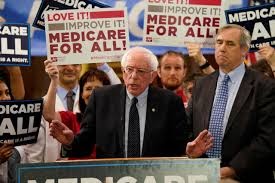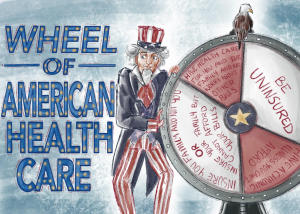Pros
Apr 29, 2020
Last year, I read about a mother choosing between her baby’s future and her health. Charlie, her daughter, was born prematurely and she started speaking at 3 years old; most babies typically start to speak at 6 months old. The mother, Rebecca Wood, cracked a tooth at around the same time her baby began to speak. Wood could not afford to pay for both speech therapy and a root canal: the choice was between her daughter and herself.
Wood paid for her daughter’s speech therapy in 2015— because of this, she was punished for that decision when an infection spread through her mouth and jaw. During surgery, she could not pay to be put fully under as the dentist drained the infection, scraped away part of the jaw, and pulled out all of her teeth. Today, Wood wears “poorly fitting” dentures— insurance only covers one new pair every five years. “[T]his is the price of a miracle [her daughter],” she states in the article.
That’s not a price that Wood should have had to pay.
It may seem aloof to be discussing a policy revolution as our country struggles through a pandemic; however, the price Wood paid was preventable, just like the sacrifice Americans are now making to cover up for our government’s failure to prevent or combat the coronavirus. If the United States adopts single-payer healthcare now, our gain would be both immediate and long-lasting.
In Germany, a country with one of the lowest fatality rates caused by COVID-19, testing has been free and widely available since the first few weeks of the outbreak. “One key to ensuring broad-based testing is that patients pay nothing for it,” reported Professor Streeck, a director of University Hospital Bonn. Meanwhile, in the United States, testing has only been widely accessible for a month.

Coronavirus testing in Germany. The country started widespread, low-cost testing a month before the US.
Susanne Herold, a lung specialist at University Hospital in Giessen, Germany, is optimistic: “We have so much capacity we are now accepting patients from Italy, Spain, and France.” Contrast that with the US where AP reports that hospitals, state governments and FEMA are bidding against one another for critical resources.
In short, the US healthcare system has left us on the wrong foot to deal with the coronavirus outbreak.
Putting aside the current crisis, “medical innovation”, which America’s hybrid healthcare system relies so heavily upon for public and financial support, is a farce. Leigh Phillips and Michal Rozworski (2019) find in The People’s Republic of Walmart that “more than three-quarters of really new drugs… are already developed in government labs” and that what pharmaceutical companies call “innovation” is actually “slight tweaks [to existing drugs]… that they then can patent” (qtd. in Burgis). Essentially, pharmaceutical “innovation” is a hoax— public, national investment, on the other hand, is targeted and transparent.
According to the Council on Foreign Relations, paying for employee insurance makes US companies less competitive abroad. Single-payer healthcare would ensure that no major company can excuse mass layoffs as a fault of health insurance.
Rebecca Wood is just one of many U.S. citizens forced to make a choice between two evils. Every day in America, patients have to make that calculation: choosing between their health, the health of someone they love, and the payment of medical bills. One proposal of single-payer healthcare is that essential expenses are not paid out-of-pocket, meaning that anyone, regardless of the status of their bank account, can pay for the care that they need.

Health insurance keeps Americans in unfulfilling jobs, and partners in dangerous marriages. Single-payer healthcare would erase the trade-off between being insured and being happy.
However, single-payer healthcare raises concerns about a government monopoly, restricting freedom of choice— “taking medical decisions away from patients,” as Stanford policy expert Lanhee Chen puts it. While this claim seems intuitive, consider the number of people that are tied to their private insurance. How many employees can’t strike out on their own because they will lose their coverage? How many husbands and wives stay with abusive spouses because of their binding health insurance? Single-payer insurance would give Americans greater freedom of choice in their lifestyle and well-being.
Rebecca Wood’s struggle with her private insurance is just one example of how private insurance violates the American ideas of choice and equal worth. To me, universal single-payer healthcare is about the message: no man left behind. America’s values inform every aspect of universal healthcare: by nature, distributed equally; its low cost allows for every American, whether working for a megacorporation or self-employed, to decide what they want for themselves and for their future.








Ansel ◊ May 12, 2020 at 10:43 am
A single government run healthcare would not work as well and would give overall worse healthcare to people than if we just paid private companies for it. By eliminating competition in healthcare you also remove the main driving force of natural industry progression. We would forced to pay the government our money through taxes for a subpar healthcare service. People looking for a specific drug to fit their need would be ignored without the competition between companies to provide better coverage.